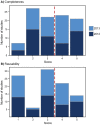Public Data Archiving in Ecology and Evolution: How Well Are We Doing?
- PMID: 26556502
- PMCID: PMC4640582
- DOI: 10.1371/journal.pbio.1002295
Public Data Archiving in Ecology and Evolution: How Well Are We Doing?
Abstract
Policies that mandate public data archiving (PDA) successfully increase accessibility to data underlying scientific publications. However, is the data quality sufficient to allow reuse and reanalysis? We surveyed 100 datasets associated with nonmolecular studies in journals that commonly publish ecological and evolutionary research and have a strong PDA policy. Out of these datasets, 56% were incomplete, and 64% were archived in a way that partially or entirely prevented reuse. We suggest that cultural shifts facilitating clearer benefits to authors are necessary to achieve high-quality PDA and highlight key guidelines to help authors increase their data's reuse potential and compliance with journal data policies.
Conflict of interest statement
The authors have declared that no competing interests exist.
Figures



Comment in
-
Open data: policies need policing.Nature. 2016 Oct 6;538(7623):41. doi: 10.1038/538041c. Nature. 2016. PMID: 27708293 No abstract available.
References
-
- Duke CS, Porter JH. The ethics of data sharing and reuse in biology. BioScience. 2013, 63: 483–489.
Publication types
MeSH terms
LinkOut - more resources
Full Text Sources
Other Literature Sources

